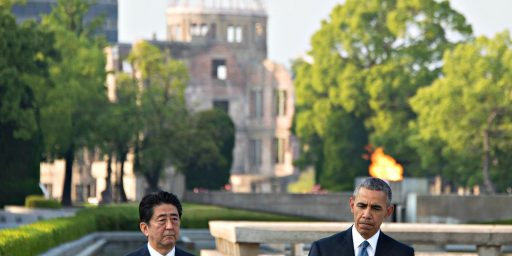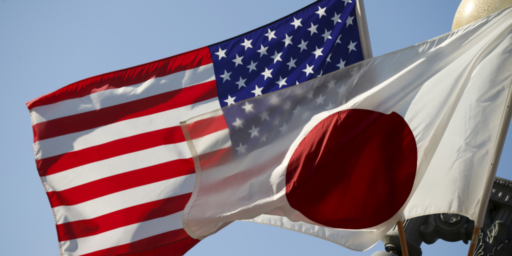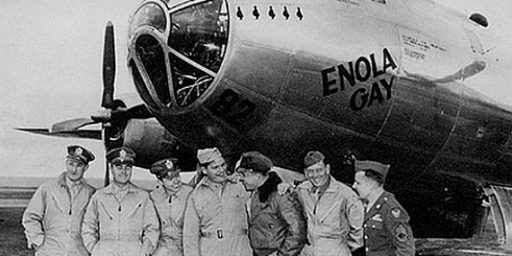The Bomb – 50 years later
So many myths have built up about atomic bombs, but Donald Sensing has an interesting essay on the atomic bombs dropped on Japan, and how/whether they factored into Japan’s surrender .
He starts off with
The most destructive American weapon against Japan was blockade; the Japanese high command̢۪s greatest fear was of blockade-induced revolution
The US Submarine Force under Admiral Lockwood (OK, plus mines dropped by the Army Air Force) had brought Japan close to industrial starvation, we see in hindsight. Plus actual physical starvation. But I ask how much did the USA know of actual conditions in Japan in July/August 1945? The answer is very little. Some of the Japanese Navy codes had been broken (Purple), but there were few “spies on the ground,†so to speak. Whether the Japanese population was in extremis was a matter of conjecture, not knowledge. We had beaten the Japanese out of most of the territories they have conquered, but their response to an invasion of the home islands was unknown.
He quotes from war veteran James Michener (via Ausin Bay)
Never once in those first days nor in the long reconsiderations later could I possibly have criticized Truman for having dropped that first bomb. True, I see now that the second bomb on Nagasaki might have been redundant and I would have been just as happy if it had not been dropped. And I can understand how some historians can argue that Japan might have surrendered without the Hiroshima bomb, but the evidence from many nations involved at that moment testify to the contrary. From my experience on Saipan and Okinawa, when I saw how violently the Japanese soldiers defended their caves to the death I am satisfied that they would have done the same on Kyushu. . . .
He recommend two books, Japan’s Longest Day , which he says is little known, but I’ve read it (years ago) and heartily concur with his recommendation. It was written by Japanese historians about 8 years after the bomb. To me, this book shows the ’fog of war’ in Tokyo, as incomplete reports were coming in from the destroyed cities to the south (Hiroshima and Nagasaki) – few communications were available as they had been destroyed. Some senior military leaders in Japan felt that Japan should resist invasion regardless of the power of this new unknown weapon. The book makes a major point about how Emperor Hirohito, for the first time ever in his reign, enforced Imperial Edict and concluded the war – without the Emperor’s unusual interference, the war would have continued. His other recommendation is Downfall: The End of the Imperial Japanese Empire , which I have not (yet) read.
Trying to simply explain the Japanese mindset then is like the pathetic attempts to explain militant Islam today using only Western concepts. Their world view was not the same as the West’s. A quick example is that Japanese soldiers were still being found hiding in jungles over 20 years after the war, convinced that Japan could never surrender. I recommend the US Gov produced 1944 documentary (or propaganda), produced by Frank Capra (OK, out of print), Know Your Enemy: Japan
As one who has walked through the memorial park at ground zero in Nagasaki, and is not “glowing-in-the-dark,†call me one who does not believe some of the hype I’ve seen on this subject (and yes, I have the science and engineering background to understand the subject, and there is no way I’d want to be near ground zero within 30 days of a nuclear detonation).






“Downfall” is excellent, the author’s goal being to examine the A-bomb decisions on the basis of what Truman et al. could’ve known at the time. Many myths are exposed along the way.
Heartily concur on the value of “Downfall.”
Even more to his credit, the author, Richard Frank, has continued his research since publishing the book. His most recent piece is in last week’s “Weekly Standard,” which supports a couple of pieces he’d published even earlier in the “Journal of Military History.”
Those pieces, in sum, make it clear that:
1. The Japanese had a very good sense of where Operation Olympic (the landings on Kyushu) would have occurred.
2. The landings would have been incredibly bloody.
3. We were developing the realization that “2” would have been true, in which case, the invasion would have been seriously postponed.
In addition, Frank’s additional research (especially highlighted in the Weekly Standard article) indicates that the Japanese were not prepared to surrender, as is often claimed, either by dint of blockade or if only the Emperor were (nominally) preserved.
Instead, Frank indicates that the Japanese were intent on “a peace on terms satisfactory to the dominant militarists. Their minimal goal was not confined to guaranteed retention of the Imperial Institution; they also insisted on preservation of the old militaristic order in Japan, the one in which they ruled.”
Needless to say, such an objective was unacceptable.